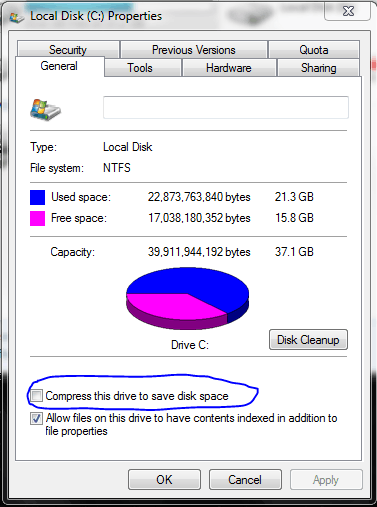25
3
I was wondering how it would effect an SSD if this was checked:

I was just curious whether it would save my SSD disk space?
25
3
I was wondering how it would effect an SSD if this was checked:

I was just curious whether it would save my SSD disk space?
20
By enabling drive compression you would save space on your hard drive, however the benefit is not without cost. Compression uses processing power (CPU). Every time you access a file, it has to be read and uncompressed to be worked with. Every file you save or edit will also have to be compressed.
Whole disk compression is not a good method for growing storage, adding another hard drive or upgrading to a larger drive is a better choice.
Not that whole disk compression is bad, there are definite advantages in the right situations. However, "what if" is not one of them.
5
Compression can have a positive effect on a computer with an older, slower disk. The CPU may have enough horsepower so that doing decompression and compression on read/write is faster than letting the drive read the raw data. It has definitely speeded up my 5 yearold laptop.
2
Only add the NTFS compression to Files and folders where you read the data most of the time. DON'T ENABLE it for folders where you write data very often. With information being compressed on the fly, you're consuming more of an SSD's available write cycles than if you were writing the files uncompressed. This could have negative implications on the drive's endurance.
4It's not at all clear to me why you'd use more write cycles through compression. If anything, I'd expect you'd use fewer, as you'd be writing less data. This ignores chips such as the sandforce which already attempts to compress data before writing to the SSD. – ChrisInEdmonton – 2015-04-11T14:02:28.177
3It's a non-issue for most modern SSDs where the write endurance exceeds the expected device life by many times. – David Schwartz – 2013-03-18T07:14:10.640
1
I don't think that compression would be all that bad on an SSD. Your operating system uses a temporary holding area for data that it needs to fetch when applications are loaded. Compressed files are decompressed and are loaded into this holding area. In Windows, this file is typically found on the root (C: presumably) of the drive. This file is called pagefile.sys. All major operating systems do this. Unix uses a special partition called the swap partition (for the ios and linux fans).
When your computer runs low on hard drive space, windows will adjust the size of how much data this file can hold thus hindering the performance of your computer when it has to shrink it because of limited resources. This is probably why hlintrup said he noticed a performance increase for his computer. He was probably out of space (hence why you would compress your file system). When he turned on file compression, it free'd up more room so the swap file could grow to an optimal size and applications could then be cached again.
Okay, so i am running a Lenovo Twist and just compressed my SSD to save space. I gained 20 gb of space and do not notice much of a change in performance. – Jay Stratemeyer – 2014-11-09T05:04:35.630
0
I have consistently found that for Samsung 120GB, this is not guaranteed. I have found less free space after compressing the drive in the majority of cases.
This leads me to believe there is an impact on overhead. Or the capacities are optimistically fudged and rely upon controller compression with a ceiling applied.
If you have less free space after enabling NTFS compression, you are doing something wrong. Files that cannot be compressed will simply be stored uncompressed and will not use up MORE space. – ChrisInEdmonton – 2015-04-11T14:04:58.007
So please offer some sort of explanation. This is a common observation that cannot be denied. I have not suggested it is the files that are consuming the space, it could be the file system itself or the drive. Consider MFT impacts, indexing impacts and cluster tip loss. I am simply putting the observation out there. – mckenzm – 2015-04-12T00:23:43.603
I can tell for sure, that i have compressed over 20 GB of data by enabling this feature on a 120 GB Samsung SSD. – Erdinc Ay – 2015-04-16T10:58:09.533
1It does not look like it is the device, so it must be Windows or the filesystem doing this. It should not be possible to "do something wrong" using a "supermarket" OS with a checkbox dialogue. It is fairly easy to reproduce in any case. – mckenzm – 2015-04-27T00:54:57.473
I can tell for sure, that i have compressed over 20 GB of data by enabling this feature on a 120 GB Samsung SSD. – Erdinc Ay – 2015-04-16T10:58:13.690